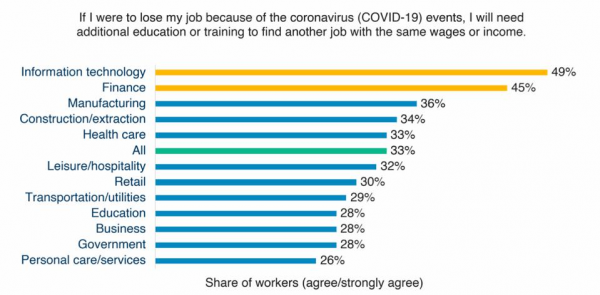The Milken Center for Advancing the American Dream shares diverse perspectives relating to our four pillars and the American Dream. The Dream looks different and means something different to everyone. While views and opinions expressed here are those of the authors and do not necessarily reflect the Center’s position, we believe it is important to explore issues from many angles to promote productive dialogue.
Daphne Kis is the CEO and a Board Member of WorldQuant University, a not-for-profit founded by Igor Tulchinsky and dedicated to advancing global education in the data sciences.
In a world driven by instant gratification, we don’t always focus on the pursuit, just the payoff. Yet dreams take time, grit and determination to achieve, and they’re anchored far in the future. Dr. Kerry Healey, President of the Milken Center for Advancing the American Dream, is wise to point to relevant job skills as a necessity for individuals to create the future they are dreaming of. Those skills are the building blocks of the American Dream, and they are a prerequisite to its fulfilment.
Acquiring Skills Is a Skill
While we know which hard skills are in demand, including artificial intelligence and blockchain, they may not be the skills that workers acquired in their primary or secondary education. In fact, for a growing percentage of the workforce, the skills needed are decidedly different skills than those they already possess. For too many workers, a misalignment between their current skill set and the new skills employers need sets them back in their professional pursuits. The idea of retraining feels like starting all over again.
This is the underlying mindset that stymies too many pursuits. It’s based on an assumption that skills (and our capacity to acquire them) are finite, and you have to predict, often as a teenager, which ones will serve you for the duration of a 50-year career.
The jobs of the future do not require fixed skill sets. They require growing and adaptive skill sets, applicable in a variety of industries and fields, where workers may already have relevant subject matter expertise. For example, financial engineering (a multidisciplinary degree at the intersection of financial management, data sciences and computer science), which is our focus at WorldQuant University, applies to virtually every industry, in multiple departments, within most organizations. When you combine a knowledge of data science with expert knowledge in a particular field for application, the employer demand is significant.
Our students use our programs to advance their existing careers in industries like financial services or enact a career change by combining prior education in physics, social sciences, or another field with data science and analysis. While our students’ backgrounds are diverse, they share one thing in common: pursuing a dream.
The mindset among our students is surprisingly simple: they want to stack valuable skills on top of valuable skills and they are lifelong learners at heart. In many cases, they do not have many of the advantages that most people in wealthy nations might take for granted.
One student in Sub-Saharan Africa told us a story about the night he had to keep refueling the generator so that he could power his computer long enough to finish his capstone project on time. He was pursuing skills that could propel him forward, and he did so with a tenacity that inspires us daily. For those with fewer privileges and advantages, new skills are perceived as opportunities, not inconveniences.
At a time when so many people are suddenly suffering, embracing that attitude is a force multiplier in the pursuit of life-long goals.

Credit: Strada Education Network COVID-19 Work and Education Survey Chart
Back to School Isn’t What It Used to Be
In the face of unprecedented rates of unemployment among Americans, the journey back to gainful employment will be challenging. And “going back to school” after experiencing a layoff is not nearly as viable today due to a range of factors, including cost.
Because of the significant cost of higher education, many people may be better off riding out the storm with unemployment insurance than taking on a mountain of debt. But are those really the only two options available to them?
As it turns out, alternatives have emerged. Online education has made enormous strides. Employers are actively recruiting from coding academies and non-traditional, professional training programs, thanks to the quality of the programs and evolution of credentialing. They do so with confidence; graduates of these programs are displaying their credentials proudly on their resumes and social media profiles, including LinkedIn.
Workers should take advantage of these opportunities, not just in moments of crisis, but for the duration of their careers. Lifelong learning is not a personality trait, it’s the only viable career strategy. For those who wish to insulate themselves from the worst effects of the current economic crisis, the answer is to acquire new skills, to combine them with the skills you already have, then to rinse and repeat with urgency.
The American Dream Does Not Need to be Deferred
Any worker willing to pursue the skills they need to achieve their American Dream has more choices available to them than ever before. However, that does not mean access and opportunity are evenly distributed. At WorldQuant University, tuition is completely free, so that the barrier of cost doesn’t preclude participation from qualified and talented individuals.
That’s why the work of the Milken Center for Advancing the American Dream is so important. It will enable people to get the skills they need for their journey.
The only question is whether individuals can change their mindset about learning new skills. Learning never stops. To reskill and upskill is not a deferment of one's dream, but progression towards it. The path may not be what you planned, but the dream is still wholly intact, and it’s waiting for you.









